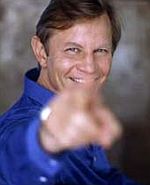A blond British actor whose handsome features were marred by his broken nose (a result of a childhood attempt to fly by leaping off the roof of a building), Michael York has seen his career span some five decades, but he is perhaps best recalled for a string of films in the late 1960s and 70s and his TV appearances from the mid-1970s on. Born Michael Johnson to an army officer turned businessman and his musician wife, he began his acting career as a teenager in a 1956 production of %22The Yellow Jacket%22. Three years later, he made his West End debut with a one-line role in a production of %22Hamlet%22. Unlike many a struggling actor, York opted to attend Oxford but spent his summers working with Michael Croft's Youth Theatre, even touring Italy in %22Julius Caesar%22. After graduating from Oxford, the actor joined Scotland's Dundee Repertory Theatre where he debuted as Sergius in Shaw's %22Arms and the Man%22. His career gained a boost when he was invited to join The National Theatre in January 1965. York was immediately cast by Franco Zeffirelli in %22Much Ado About Nothing%22 which led to roles in %22Hay Fever%22 and %22The Royal Hunt of the Sun%22. Following his BBC debut as Young Jolyon in the acclaimed and fondly recalled drama series %22The Forsyte Saga%22 (1966), he made his screen debut in Zeffirelli's %22The Taming of the Shrew%22 (1967).
In 1968, York garnered a great deal of attention for his vibrant portrayal of Tybalt in Zeffirelli's %22Romeo and Juliet%22. He went on to portray a variety of well-bred, seductively charming men like the manipulative bisexual of %22Something for Everyone%22 (1970) and, more memorably, the adventurous expatriate writer Brian Roberts in %22Cabaret%22 (1972) opposite Liza Minnelli. York was impressive as another expatriate writer in Nazi Germany in %22England Made Me%22 and cut a dashing D'Artagnan in Richard Lester's romping version of %22The Three Musketeers%22 (both 1973). Although he was overshadowed by his flashy co-stars in the Agatha Christie adaptation %22Murder on the Orient Express%22 (1974), he proved effective in the leading role of the sci-fi thriller %22Logan's Run%22 (1976).
York offered a fine performance as the Dickens' hero Pip in a 1974 NBC adaptation of %22Great Expectations%22 and reunited with his mentor Franco Zeffirelli to play John the Baptist in the acclaimed miniseries %22Jesus of Nazareth%22 (NBC, 1977). He returned to his theatrical roots succeeding Richard Gere in the leading role of Max, a homosexual concentration camp inmate who pretends to be Jewish, in the Broadway production of %22Bent%22 in 1979. That same year, he made his debut as a motion picture producer with %22The Riddle of the Sands%22, a slow-moving adaptation of Erskine Childers' prototypical spy novel.
As the 80s progressed, York attempted his first stage musical (the ill-fated %22The Little Prince%22 which closed on Broadway during previews) before settling in as a fairly regular presence on the small screen. He pursued a soprano who also caught the eye of %22The Phantom of the Opera%22 (CBS, 1983), proved he could still be a dashing swashbuckler in %22The Master of Ballantrae%22 (CBS, 1984) and earned a Daytime Emmy nomination as a music video producer who discovers his wife may not be dead but still alive and living on the streets in %22Are You My Mother?%22, a 1986 %22ABC Afterschool Special%22. He joined the cast of the popular long-running primetime CBS serial %22Falcon Crest%22 during the 1987-88 season as a love interest for Donna Mills.
York, now more mature, returned to Broadway as the crusading clergyman in a 1992 revival of Arthur Miller's %22The Crucible%22 and was seen briefly as Rachel Ward's husband in %22Wide Sargasso Sea%22 (1993). He began to essay authority figures or other characters who carried the weight of experience and age, such as his Merlin in the feature %22A Young Connecticut Yankee in King Arthur's Court%22 (1995) and his King Arthur in the TV-movie %22A Knight in Camelot%22 (ABC, 1998). A new generation of fans came to know York as Basil Exposition, the head of British intelligence, in the Mike Myers hit spoof %22Austin Powers: International Man of Mystery%22 (1997) and its sequel %22Austin Powers: The Spy Who Shagged Me%22 (1999). He enjoyed an unlikely success playing a venal media mogul in the Christian-themed drama %22The Omega Man%22 (also 1999) as well as in its 2001 sequel %22Meggido: The Omega Code 2%22. He essayed an exacting headmaster of a boys' reform school in %22Borstal Boy%22 (2000), based on the life of Irish writer Brendan Behan and earned an Emmy nomination for his turn as an aging Errol Flynn-like actor in the AMC original series %22The Lot%22 in 2001.



